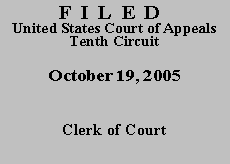

| TONY LORENZO SNYDER,
Plaintiff-Appellant, v. JOHN WHETSEL, Sheriff sued in his individual capacity; JOHNNY DIRCK, sued in his individual capacity; CLIFF URANGA, Captain sued in his individual capacity; BOBBY CARSON, Captain sued in his individual capacity; A. HARMON, Oklahoma City police officer sued in his individual capacity; JOHN DOES 1-7, Detention Officers sued in their individual capacities; CARPENTER, Detention Officer sued in his individual capacity; GRANNADA, sued in his individual capacity; JANE DOE, sued in her individual capacity; SHOOPMAN, Detention Officer sued in his individual capacity. Defendants-Appellees. |
|
Pro se plaintiff Tony Lorenzo Snyder appeals the district court's dismissal of his 42 U.S.C. § 1983 civil rights complaint, and that court's denial of his request for appointment of counsel. We have jurisdiction under 28 U.S.C. § 1291 and affirm.
Mr. Snyder's eleven-count complaint alleges that while he was a pretrial detainee in the Oklahoma County Detention Center defendants violated certain of his rights guaranteed by the United States Constitution. The district court adopted the magistrate judge's report and recommendation, dismissing without prejudice counts one, two, and six, concerning excessive force and conspiracy, for failure to exhaust administrative remedies under 42 U.S.C. § 1997e(a), and dismissing without prejudice the remaining eight counts for failure to state a claim under Fed. R. Civ. P. 12(b)(6) and 8(a).(1) The district court, by separate order, also denied Mr. Snyder's motion for appointment of counsel. This appeal, in which Mr. Snyder challenges the dismissal of counts one, two, and six, and the denial of his motion to appoint counsel, followed.
We review a district court's decision regarding exhaustion de novo. Jernigan v. Stuchell, 304 F.3d 1030, 1032 (10th Cir. 2002). We review a district court's denial of a motion for appointment of counsel in a civil case for abuse of discretion. Rucks v. Boergermann, 57 F.3d 978, 979 (10th Cir. 1995). Because Mr. Snyder is representing himself, we construe his pleadings liberally. Hall v. Bellmon, 935 F.2d 1106, 1110 (10th Cir. 1991).
The Prison Litigation Reform Act (PLRA) requires prisoners to timely and completely exhaust available administrative remedies before filing suit under 42 U.S.C. § 1983 concerning prison conditions. 42 U.S.C. § 1997e(a); Booth v. Churner, 532 U.S. 731, 741 (2001); Jernigan, 304 F.3d at 1032. In a § 1983 action, the burden is on the prisoner to sufficiently plead exhaustion, which includes supplying supporting documentation of exhaustion, or in its absence, describing with specificity prison grievance proceedings. Steele v. Fed. Bureau of Prisons, 355 F.3d 1204, 1209-10 (10th Cir. 2003), cert. denied, 125 S. Ct. 344 (2004).
Mr. Snyder asserts that the district court erroneously dismissed counts one, two, and six because he attempted to exhaust his administrative remedies. Our review of the record reveals that Mr. Snyder's attempts amounted to general allegations that he had submitted requests to staff that were never answered, and general allegations that he had requested grievance forms that were not provided. His complaint did not, with respect to counts one, two, or six, make the particularized averments of exhaustion that our case law requires. See id. at 1211 (stating that action must be dismissed under § 1997e where particularized averments concerning exhaustion are absent). We therefore see no error in the district court's dismissal without prejudice of these three counts for failure to exhaust administrative remedies.
Mr. Snyder also challenges the district court's denial of his motion for appointment of counsel, claiming that he "litigated from a cell . . . without [a] law library . . . [which] is unfair on its face," Aplt. Br. at 19. In a similar vein, he argues that, without counsel, he has been unable to demonstrate his attempts to exhaust administrative remedies. "The appointment of counsel in a civil case is left to the sound discretion of the district court." Shabazz v. Askins, 14 F.3d 533, 535 (10th Cir. 1994). The district court in this case considered the factors pertinent to deciding whether to appoint counsel and found appointment of counsel unnecessary. See Rucks, 57 F.3d at 979 (listing factors). Our review leads us to conclude that the district court did not abuse its discretion in reaching that conclusion.
Mr. Snyder's motion to proceed on appeal in forma pauperis is GRANTED, and we remind him that he remains obligated to make partial payments until the entire appellate filing fee is paid. Both the district court's July 15, 2004, order dismissing Mr. Snyder's civil rights complaint without prejudice to refiling, and that court's July 7, 2004, order denying Mr. Snyder's motion for appointment of counsel, are AFFIRMED. The mandate shall issue forthwith.
Entered for the Court
Circuit Judge
*. This order and judgment is not binding precedent, except under the doctrines of law of the case, res judicata, and collateral estoppel. The court generally disfavors the citation of orders and judgments; nevertheless, an order and judgment may be cited under the terms and conditions of 10th Cir. R. 36.3.
1. When a prisoner's complaint concerning prison conditions contains one or more unexhausted claims, the district court usually must dismiss the complaint in its entirety and without prejudice to refiling. Ross v. County of Bernalillo, 365 F.3d 1181, 1189, 1190 (10th Cir. 2004); 42 U.S.C. 1997e(a) (prohibiting an "action" from proceeding until available administrative remedies are exhausted). But where, as here, "a claim . . . fails to state a claim upon which relief can be granted, . . . the court may dismiss the underlying claim without first requiring the exhaustion of administrative remedies," Ross, 365 F.3d at 1190 n.13 (quoting § 1997e(c)(2)).